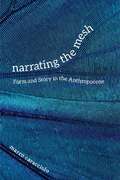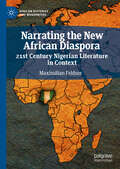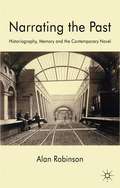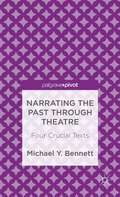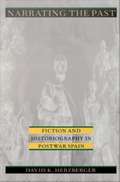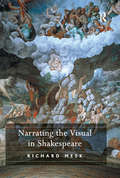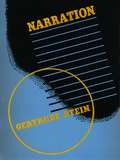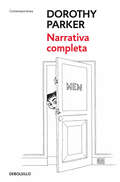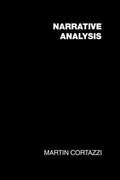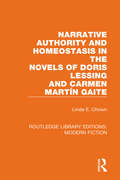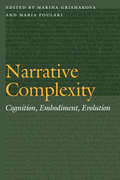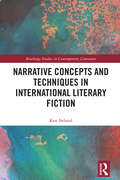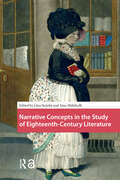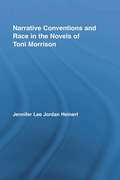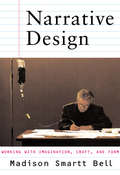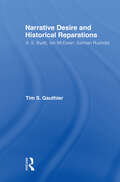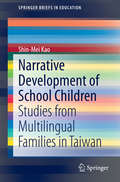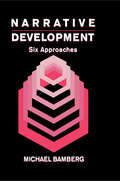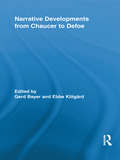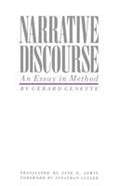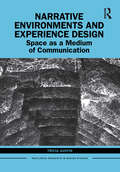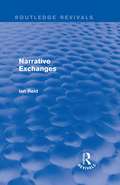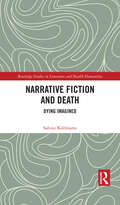- Table View
- List View
Narrating the Crusades
by Lee ManionIn Narrating the Crusades, Lee Manion examines crusading's narrative-generating power as it is reflected in English literature from c. 1300 to 1604. By synthesizing key features of crusade discourse into one paradigm, this book identifies and analyzes the kinds of stories crusading produced in England, uncovering new evidence for literary and historical research as well as genre studies. Surveying medieval romances including Richard Cœur de Lion, Sir Isumbras, Octavian, and The Sowdone of Babylone alongside historical practices, chronicles, and treatises, this study shows how different forms of crusading literature address cultural concerns about collective and private action. These insights extend to early modern writing, including Spenser's Faerie Queene, Marlowe's Tamburlaine, and Shakespeare's Othello, providing a richer understanding of how crusading's narrative shaped the beginning of the modern era. This first full-length examination of English crusading literature will be an essential resource for the study of crusading in literary and historical contexts.
Narrating the Mesh: Form and Story in the Anthropocene (Under the Sign of Nature)
by Marco CaraccioloA hierarchical model of human societies’ relations with the natural world is at the root of today’s climate crisis; Narrating the Mesh contends that narrative form is instrumental in countering this ideology. Drawing inspiration from Timothy Morton’s concept of the "mesh" as a metaphor for the human-nonhuman relationship in the face of climate change, Marco Caracciolo investigates how narratives in genres such as the novel and the short story employ formal devices to effectively channel the entanglement of human communities and nonhuman phenomena.How can narrative undermine linearity in order to reject notions of unlimited technological progress and economic growth? What does it mean to say that nonhuman materials and processes—from contaminated landscapes to natural evolution—can become characters in stories? And, conversely, how can narrative trace the rising awareness of climate change in the thick of human characters’ mental activities? These are some of the questions Narrating the Mesh addresses by engaging with contemporary works by Ted Chiang, Emily St. John Mandel, Richard Powers, Jeff VanderMeer, Jeanette Winterson, and many others. Entering interdisciplinary debates on narrative and the Anthropocene, this book explores how stories can bridge the gap between scientific models of the climate and the human-scale world of everyday experience, powerfully illustrating the complexity of the ecological crisis at multiple levels.
Narrating the New African Diaspora: 21st Century Nigerian Literature In Context (African Histories and Modernities)
by Maximilian FeldnerThis book provides the first comprehensive survey and collection of Nigerian diaspora literature, offering readings of novelists such as Chimamanda Ngozi Adichie, Sefi Atta, Helon Habila, Helen Oyeyemi, Taiye Selasi, Chika Unigwe, Chris Abani, and Ike Oguine. As members of the new African diaspora, their literature captures experiences of recent Nigerian migration to the United States and the United Kingdom. Examining representative novels, such as Adichie’s Half of a Yellow Sun and Americanah, Habila’s Waiting for an Angel, Abani’s GraceLand, and Oyeyemi’s The Icarus Girl, the book discusses these novels’ literary and narrative methods and provides detailed analyses of two of the most common themes: depictions of migratory experiences and representations of Nigeria. Placing the novels in their relevant historical, sociological, philosophical, and theoretical contexts, Narrating the New African Diaspora presents an insightful study of current anglophone Nigerian narrative literature.
Narrating the Past
by Alan RobinsonIn recent years controversy has surrounded the narrative turn in history and the historical turn in fiction. This book clarifies what is at stake, tracing connections between historiography and life-writing, arguing that the challenges posed in representing the past illuminate issues which are central to all literary narrative.
Narrating the Past through Theatre
by Michael Y. BennettThis cutting-edge title explores how narrating the past both conflicts and creates an interesting relationship with drama's 'continuing present' that arcs towards an unpredictable future. Theatre both brings the past alive and also fixes it, but through the performance process, allowing the past to be molded for future (not-yet-existent) audiences.
Narrating the Past: Fiction and Historiography in Postwar Spain
by David K. HerzbergerThe relationship between fiction and historiography in Francoist Spain (1939-1975) is a contentious one. The intricacies of this relationship, in which fiction works to subvert the regime's authority to write the past, are the focus of David K. Herzberger's book. The narrative and rhetorical strategies of historical discourse figure in both the fiction and historiography of postwar Spain. Herzberger analyzes these strategies, identifying the structures and vocabularies they use to frame the past and endow it with particular meanings. He shows how Francoist historians sought to affirm the historical necessity of Franco by linking the regime to a heroic and Christian past, while several types of postwar fiction--such as social realism, the novel of memory, and postmodern novels--created a voice of opposition to this practice. Focusing on the concept of writing history that these opposing strategies convey, Herzberger discloses the layering of truth and meaning that lies at the heart of postwar Spanish narrative from the early 1940s to the fall of Franco. His study clearly reveals how the novel in postwar Spain became a crucial form of dissent from the past as it was conceived and used by the State. Making a decisive intervention in the debate about the ways in which narration determines both the meaning and truth of history and fiction, Narrating the Past will be of special interest to students and scholars of the politics, history, and literature of twentieth-century Spain.
Narrating the Visual in Shakespeare
by Richard MeekThis book examines Shakespeare's fascination with the art of narrative and the visuality of language. Richard Meek complicates our conception of Shakespeare as either a 'man of the theatre' or a 'literary dramatist', suggesting ways in which his works themselves debate the question of text versus performance. Beginning with an exploration of the pictorialism of Shakespeare's narrative poems, the book goes on to examine several moments in Shakespeare's dramatic works when characters break off the action to describe an absent, 'offstage' event, place or work of art. Meek argues that Shakespeare does not simply prioritise drama over other forms of representation, but rather that he repeatedly exploits the interplay between different types of mimesis - narrative, dramatic and pictorial - in order to beguile his audiences and readers. Setting Shakespeare's works in their literary and rhetorical contexts, and engaging with contemporary literary theory, the book offers new readings of Venus and Adonis, The Rape of Lucrece, Hamlet, King Lear and The Winter's Tale. The book will be of particular relevance to readers interested in the relationship between verbal and visual art, theories of representation and mimesis, Renaissance literary and rhetorical culture, and debates regarding Shakespeare's status as a literary dramatist.
Narration: Four Lectures
by Gertrude SteinNewly famous in the wake of the publication of her groundbreaking Autobiography of Alice B. Toklas, Gertrude Stein delivered her Narration lectures to packed audiences at the University of Chicago in 1935. Stein had not been back to her home country since departing for France in 1903, and her remarks reflect on the changes in American culture after thirty years abroad.In Stein’s trademark experimental prose, Narration reveals the legendary writer’s thoughts about the energy and mobility of the American people, the effect of modernism on literary form, the nature of history and its recording, and the inventiveness of the English language—in particular, its American variant. Stein also discusses her ambivalence toward her own literary fame as well as the destabilizing effect that notoriety had on her daily life. Restored to print for a new generation of readers to discover, these vital lectures will delight students and scholars of modernism and twentieth-century literature.“Narration is a treasure waiting to be rediscovered and to be pirated by jolly marauders of sparkling texts.”—Catharine Stimpson, NYU
Narrativa completa
by Dorothy ParkerPor primera vez en castellano la narrativa completa de Dorothy Parker, una señora que supo vivir y escribir a la altura de su talento. Dorothy Parker escribió una vez que lo suyo era tomarse un Martini, dos como mucho. Después del tercero, ya estaba debajo de la mesa, y al cuarto... debajo de su anfitrión. Con esas premisas, y haciendo gala de un humor que arañaba los buenos hábitos de la burguesía de entonces, cabe entender que la misma Dorothy se convirtiese en personaje, y que su obra se leyera a menudo como la alegre guarnición de una vida dedicada al chiste ingenioso. Los años fueron pasando, y el tiempo ha revelado que esta protagonista indiscutible de las tertulias más animadas del Nueva York de entreguerras, esposa infiel y amante solícita, fue además una escritora de primer orden, capaz de resumir en pocas páginas la hipocresía de una sociedad que crecía a la sombra de un dinero recién estrenado y de unas costumbres que se caían de viejas. Así lo muestran las mujeres y los hombres que deambulan por sus cuentos, seres patéticos que lloran en habitaciones exquisitamente decoradas, flirtean con un empeño digno de mejores causas, o ríen sin ganas en la barra de un bar para olvidar que alguna vez fueron felices. Es más, basta con acercarnos un poco a esas parejas desesperadas y tiernas para darnos cuenta de que la prosa de Dorothy Parker no ha muerto. Al contrario, su protesta es más actual que nunca, su sonrisa aún nos acompaña, su amor por Nueva York cala hondo, y su ironía es el mejor de los regalos en una época de tanta perplejidad. Reseña:«La posteridad ha obrado en favor de una autora que, al menos en lo que a la sensibilidad femenina se refiere, fue una auténtica visionaria.»El Mundo «La Narrativa completa de Dorothy Parker es un acercamiento sin preámbulos al universo rompedor, rebelde y amante de Nueva York, y a los claroscuros de la escritora más importante e infravalorada de la época.»Cosuki Naru, Mycelebrityskin.net
Narrative Analysis: Social Research and Educational Studies Series
by Martin CortazziThe book examines models of narrative analysis currently proposed in linguistics, sociology, psycology, anthropology and literature and applies insights from these disciplines to the study of teachers' narratives. <P><P>The author proposes an alternative approach to studying narratives which is then applied to original data, demonstrating how narrative analysis can be used to study primary teachers' perceptions of their work.
Narrative Authority and Homeostasis in the Novels of Doris Lessing and Carmen Martín Gaite (Routledge Library Editions: Modern Fiction)
by Linda E. ChownThis study, originally published in 1990, assesses a shift in the presentation of self-consciousness in two pairs of novels by Doris Lessing and Carmen Martín Gaite: 1) Lessing’s The Summer Before the Dark (1973) and Martín Gaite’s Retahílas (1974) and 2) Lessing’s The Memoirs of a Survivor (1974) and Martín Gaite’s The Back Room (1978). Three major structural divisions facilitate examining implications of the novels for 1) feminism 2) literary narrative and 3) the lives of people-at-large.
Narrative Complexity: Cognition, Embodiment, Evolution (Frontiers of Narrative)
by Maria Poulaki Marina GrishakovaThe variety in contemporary philosophical and aesthetic thinking as well as in scientific and experimental research on complexity has not yet been fully adopted by narratology. By integrating cutting-edge approaches, this volume takes a step toward filling this gap and establishing interdisciplinary narrative research on complexity.Narrative Complexity provides a framework for a more complex and nuanced study of narrative and explores the experience of narrative complexity in terms of cognitive processing, affect, and mind and body engagement. Bringing together leading international scholars from a range of disciplines, this volume combines analytical effort and conceptual insight in order to relate more effectively our theories of narrative representation and complexities of intelligent behavior. This collection engages important questions on how narrative complexity functions as an agent of cultural evolution, how our understanding of narrative complexity can be extended in light of new research in the social sciences and humanities, how interactive media produce new types of narrative complexity, and how the role of embodiment as a factor of narrative complexity acquires prominence in cognitive science and media studies. The contributors explore narrative complexity transmitted through various semiotic channels, embedded in multiple contexts, and experienced across different media, including film, comics, music, interactive apps, audiowalks, and ambient literature.
Narrative Concepts and Techniques in International Literary Fiction (Routledge Studies in Contemporary Literature)
by Ken IrelandThe omnipresence of narrative in our real-life experience and in the media world makes it a vital and relevant factor for study. This book presents an easily accessible guide to a series of key narrative topics, with concise entries in a transparent format of compact paragraphs allowing quick reference and omitting footnotes and endnotes to aid fluency. It uses throughout a wide range of illustrative examples from Western and non-Western literature, stressing the universal relevance and application of narrative concepts and techniques. These examples are intended to stimulate interest in less familiar, non-mainstream but important texts, and to highlight unsuspected features in more familiar texts. Engaging with texts from Africa and Asia, the Americas and Australasia, as well as from Britain and Europe, it will appeal to students of comparative literature, to creative writers, whose awareness of available techniques and devices can prompt fresh ideas and approaches, and will introduce general readers can be introduced to new areas of literary experience.
Narrative Concepts in the Study of Eighteenth-Century Literature (Crossing Boundaries: Turku Medieval and Early Modern Studies)
by Liisa Steinby Aino MäkikalliThis collection of essays studies the encounter between allegedly ahistorical concepts of narrative and eighteenth-century literature from across Europe. At issue is the question of whether the theoretical concepts underpinning narratology are, despite their appearance of ahistorical generality, actually derived from the historical study of a particular period and type of literature. The essays take on aspects of eighteenth-century texts such as plot, genre, character, perspective, temporality, and more, coming at them from both a narratological and a historical perspective.
Narrative Conventions and Race in the Novels of Toni Morrison (Studies in Major Literary Authors)
by Jennifer Lee HeinertThis study analyzes the relationship between race and genre in four of Toni Morrison’s novels: The Bluest Eye, Tar Baby, Jazz, and Beloved. Heinert argues how Morrison’s novels revise conventional generic forms such as bildungsroman, folktales, slave narratives, and the formal realism of the novel itself. This study goes beyond formalist analyses to show how these revisions expose the relationship between race, conventional generic forms, and the dominant culture. Morrison’s revisions critique the conventional roles of African Americans as subjects of and in the genre of the novel, and (re)write roles which instead privilege their subjectivity. This study provides readers with new ways of understanding Morrison’s novels. Whereas critics often fault Morrison for breaking with traditional forms and resisting resolution in her novels, this analysis show how Morrison’s revisions shift the narrative truth of the novel from its representation in conventional forms to its interpretation by the readers, who are responsible for constructing their own resolution or version of narrative truth. These revisions expose how the dominant culture has privileged specific forms of narration; in turn, these forms privilege the values of the dominant culture. Morrison’s novels attempt to undermine this privilege and rewrite the canon of American literature.
Narrative Design: Working With Imagination, Craft, And Form
by Madison Smartt BellWith clarity, verve, and the sure instincts of a good teacher, Madison Smartt Bell offers a roll-up-your-sleeves approach to writing in this much-needed book. Focusing on the big picture as well as the crucial details, Bell examines twelve stories by both established writers (including Peter Taylor, Mary Gaitskill, and Carolyn Chute) and his own former students. A story's use of time, plot, character, and other elements of fiction are analyzed, and readers are challenged to see each story's flaws and strengths. Careful endnotes bring attention to the ways in which various writers use language. Bell urges writers to develop the habit of thinking about form and finding the form that best suits their subject matter and style. His direct and practical advice allows writers to find their own voice and imagination.
Narrative Desire and Historical Reparations: A.S. Byatt, Ian McEwan, and Salman Rushdie (Literary Criticism and Cultural Theory)
by Timothy GauthierFirst published in 2006. Routledge is an imprint of Taylor & Francis, an informa company.
Narrative Development in Young Children
by David Mcneill Levy, Elena T. and McNeill, David Elena T. LevyAs children begin to use language in early childhood, they produce increasingly large units of coherent speech, including narrative descriptions of events. This book examines the process of narrative development in young children, focusing on the development of 'cohesion' - the use of speech and gesture to create coherent perspectives on events. Surveying early narrative development in which gesture plays an integral part, the book explores the development of cohesive, clause-linking devices during the period from age two to three. Illustrated with longitudinal cases studies, the book examines the crib-talk of two-year-old Emily and compares it to the discourse patterns of storybooks and nursery rhymes, and to her father's pre-bedtime routines. In a second case study, the authors trace the changing relationships between speech and gesture in the spontaneous narratives of two-year-old Ella. This book will be invaluable to students and researchers in language acquisition, developmental psychology and gesture studies.
Narrative Development of School Children
by Shin-Mei KaoThis book reports the current aspects of children from multilingual families in Taiwan and describes these children's perceptions towards their linguistic, academic, and social development from a survey study and a discourse analysis study. The discourse analysis study focuses on the narrative developments of children born to Southeast Asian mothers versus average Taiwanese children across four grade levels in the elementary school. This book is significant in four aspects: describing the children with multilingual family background qualitatively and quantitatively, including a wide range and a large number of participants, proposing new analytical approaches for child narrative research, and compiling applicable classroom activities based on of research findings. The cultural and linguistic background of the children described in this book may be of interest to researchers and educators not only in Chinese-speaking regions, but also in areas where the phenomenon of multilingual family is becoming common in the society.
Narrative Development: Six Approaches
by Michael BambergGrowing out of an International Society of the Study of Behavioral Development-sponsored symposium, this book discusses the basic assumptions that led the contributors to conduct research in the field of narrative development. This collection gathers their research reflections and varying approaches to narrative and its development. It illustrates each type of approach and highlights their respective motives. The book presents some of the basic motivating assumptions of each approach and provides insight into what holds each set of assumptions together, potentially transforming them into actions. This book will serve as an excellent text for courses emphasizing multiple approaches to the study of narrative. The editor has organized this volume in accordance with the six main points of the symposium: * Specification of the Domain--how narratives are defined in terms of textual structures, knowledge thereof, interactive moves, sociocultural conventions, and the like. * The Individual's Involvement in the Developmental Process--the relationship between some internal or external forces and the organism's own active participation in the developmental process. * The Course of Development--if it is continuous or discontinuous; whether it proceeds in an additive fashion or whether regressive phases occur; and what changes at different points in the developmental process signify. * The Goal of Development--the implicit notion of a telos, a target or end-point that needs to occur in the developmental process. * Mechanisms of Development--the forces and/or conditions that both instigate the developmental process and keep it moving toward its telos. * Methodology--where and how to look in the establishment of a developmental framework. This book is an indispensable text in the fields of narrative and/or discourse, linguistics, language studies, psychology, and education in general.
Narrative Developments from Chaucer to Defoe (Routledge Studies in Renaissance Literature and Culture)
by Gerd Bayer Ebbe KlitgårdThis collection analyzes how narrative technique developed from the late Middle Ages to the beginning of the 18th century. Taking Chaucer’s influential Middle English works as the starting point, the original essays in this volume explore diverse aspects of the formation of early modern prose narratives. Essays focus on how a sense of selfness or subjectivity begins to establish itself in various narratives, thus providing a necessary requirement for the individuality that dominates later novels. Other contributors investigate how forms of intertextuality inscribe early modern prose within previous traditions of literary writing. A group of chapters presents the process of genre-making as taking place both within the confines of the texts proper, but also within paratextual features and through the rationale behind cataloguing systems. A final group of essays takes the implicit notion of the growing realism of early modern prose narrative to task by investigating the various social discourses that feature ever more strongly within the social, commercial, or religious dimensions of those texts. The book addresses a wide range of literary figures such as Chaucer, Wroth, Greene, Sidney, Deloney, Pepys, Behn, and Defoe. Written by an international group of scholars, it investigates the transformations of narrative form from medieval times through the Renaissance and the early modern period, and into the eighteenth century.
Narrative Discourse: An Essay In Method
by Gerard GenetteGerard Genette builds a systematic theory of narrative upon an anlaysis of the writings of Marcel Proust, particularly 'Remembrance of Things Past.' Adopting what is essentially a structuralist approach, the author identifies and names the basic constituents and techniques of narrative and illustrates them by referring to literary works in many languages.
Narrative Environments and Experience Design: Space as a Medium of Communication (Routledge Research in Design Studies)
by Tricia AustinThis book argues narrative, people and place are inseparable and pursues the consequences of this insight through the design of narrative environments. This is a new and distinct area of practice that weaves together and extends narrative theory, spatial theory and design theory. Examples of narrative spaces, such as exhibitions, brand experiences, urban design and socially engaged participatory interventions in the public realm, are explored to show how space acts as a medium of communication through a synthesis of materials, structures and technologies, and how particular social behaviours are reproduced or critiqued through spatial narratives. This book will be of interest to scholars in design studies, urban studies, architecture, new materialism and design practitioners in the creative industries.
Narrative Exchanges (Routledge Revivals)
by Ian ReidFirst published in 1992, Narrative Exchanges shows how a general model of communicative exchanges can be refined to deal with the complexities of narrative fiction. Going beyond the two-way structure of reciprocity, it gives particular attention to the processes of framing, substitution and dispossession by which written texts generate meaning. The title provides an innovative way of combining narrative and exchange theory, bringing the two areas of thought into a mutually critical relationship. Using a wide variety of narrative texts, literary and non-literary, canonical and non-canonical, authors discussed include Flaubert, Achebe, Mansfield, Boccaccio, Duras, Daudet, Moorhouse, DeLillo and Wordsworth. Drawing on perspectives from anthropology, linguistics and education, and combining accessible readings with theoretical debate, Ian Reid makes a significant contribution to the debate about narrative theory.
Narrative Fiction and Death: Dying Imagined (Routledge Studies in Literature and Health Humanities)
by Sabine KöllmannNarrative Fiction and Death: Dying Imagined offers a new perspective on the study of death in literature. It focuses on narrative fiction that conveys the experience of dying from the internal perspective of a dying protagonist. Writers from Victor Hugo in the early 1800s to Elif Shafak in the present day have imagined the unknowable final moments on the threshold to death. This literary study examines the wide range of narrative strategies used to evoke the transition from life to death, and to what effect, revealing not only each writer’s unique way of representing the dying experience; the comparative reading also finds common concerns in these texts and uncovers surprising parallels and unexplored intertextual relations between works across time and space that will interest comparatists as well as specialists in the literatures discussed. Students of individual texts examined here will benefit from detailed analyses of these works. The fictional evocation of dying addresses our basic human fears, offering catharsis, consolation, and a greater cognitive and emotional understanding of that unknowable experience. Presented in an engaging and highly readable manner, this study argues for literature’s potential to challenge our assumptions about the end of life and change our approach to dying, an aspect that will interest students and researchers of the health humanities, palliative caregivers, and all those interested in questions of the end of life.

